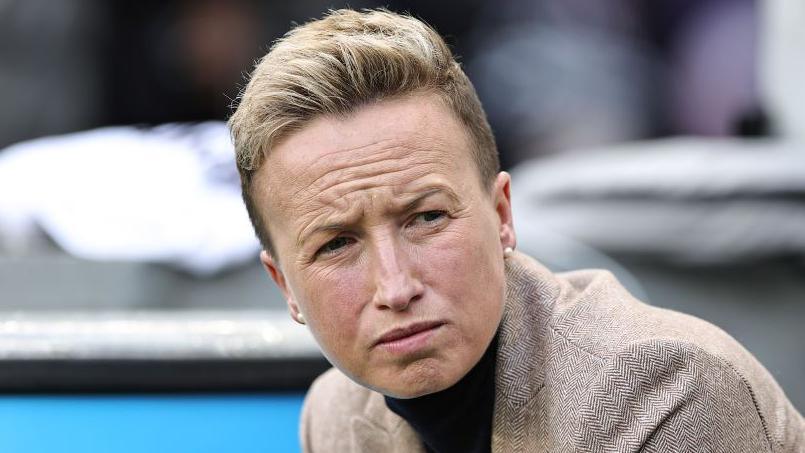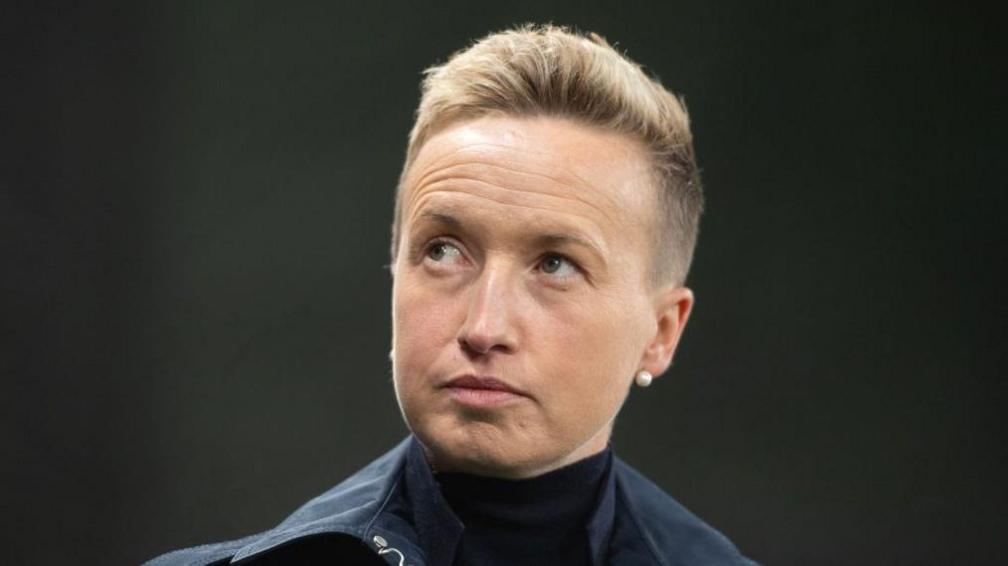Priestman removed as Olympic boss over drone incident

Beverly Priestman took charge of Canada in 2020, helping her side to Olympic gold at Tokyo in 2021
- Published
Canada women's football manager Beverly Priestman has been removed as Olympic head coach and suspended by the country's football federation as the fall out continued after a drone was flown over New Zealand's training session on Monday.
Canada Soccer said it took the action because "over the past 24 hours, additional information has come to our attention regarding previous drone use against opponents, predating the Paris 2024 Olympic Games".
English-born Priestman, 38, had "voluntarily" withdrawn from her side's opening 2-1 victory over the Kiwis on Thursday, while Jasmine Mander, Priestman's assistant, was sent home along with "unaccredited analyst" Joseph Lombardi.
On Thursday a French court said Lombardi had been handed an eight-month suspended jail sentence after pleading guilty to flying a drone in an urban area without a licence.
In a statement Canada Soccer chief executive Kevin Blue confirmed Priestman will be suspended for the remainder of the Games while an "independent external review" takes place.
Assistant coach Andy Spence will take charge for the remainder of the Games, with the defending Olympic champion's next game against France on Sunday.
Speaking at a news conference on Friday, Canadian Olympic Committee chief executive David Shoemaker said: "One of the key pieces of information was the conclusion from Canada Soccer that (Priestman) needed to be suspended based on their accumulation of facts.
"I've seen some of the information they have, and we gathered some additional information ourselves that made me conclude that she was highly likely to have been aware of the incidents here."
In a statement on Wednesday, Priestman confirmed she took responsibility for the actions of her colleagues after a scouting report filed by Lombardi was sent to Mander.
Following the incident, Priestman said: "I first and foremost want to apologise to the players and staff at New Zealand Football and to the players on Team Canada. This does not represent the values that our team stands for.
"I am ultimately responsible for conduct in our program."
Shoemaker added he was "comfortable with the team competing as it is".
"If more facts and circumstances emerge, we can continue to contemplate further action as necessary," he said.
"It's important to me that Canadians' questions are answered, and so we're going to continue to do our best to answer those questions."
Fifa also opened their own disciplinary proceedings against Priestman, Lombardi and Mander on Wednesday.
Who is Priestman?
County Durham-born Priestman started her professional coaching career with Canada women's Under-17s in 2013 before progressing through to the Under-20 side.
Priestman, who did not play football professionally, returned to England to coach the England Under-17 women's side.
Her quality was quickly seen by Phil Neville in 2018 when the former England women's head coach brought in the 38-year-old as his assistant coach.
Following two years with England, Priestman returned to Canada to take over as manager where she led them to Olympic gold at Tokyo in 2021, defeating Sweden on penalties in the final.
Only a year later Canada reached the Concacaf W Championship final, but were defeated 1-0 by the United States.
Her early success in management was followed by a disappointing World Cup campaign in 2023 after Canada failed to progress from the group stage.
Priestman is married to former New Zealand midfielder Emma Humphries.
Analysis
Jo Currie, BBC Sport women's sport reporter
This is extremely embarrassing for Canada Soccer and devastating for Priestman personally. Leading the team to Olympic gold in Tokyo three years ago was arguably the biggest moment in the team's history and her career.
The fact that these latest revelations show that the use of drones to spy on opposition teams has been going on since before the Paris Games will raise big questions over who authorised such a tactic, who knew about it and when did it begin? Priestman's job as head coach post-Olympics will certainly be called into question.
As a federation, you'd imagine Canada Soccer will now also be looking to see if this is an isolated problem solely within the women's national team or ingrained across the organisation as a whole.
For the players, they will need to park these off-field problems as best they can, and quickly, as they face hosts France on Sunday in their second group game.
Related topics
- Published24 July 2024

- Published10 August 2024
